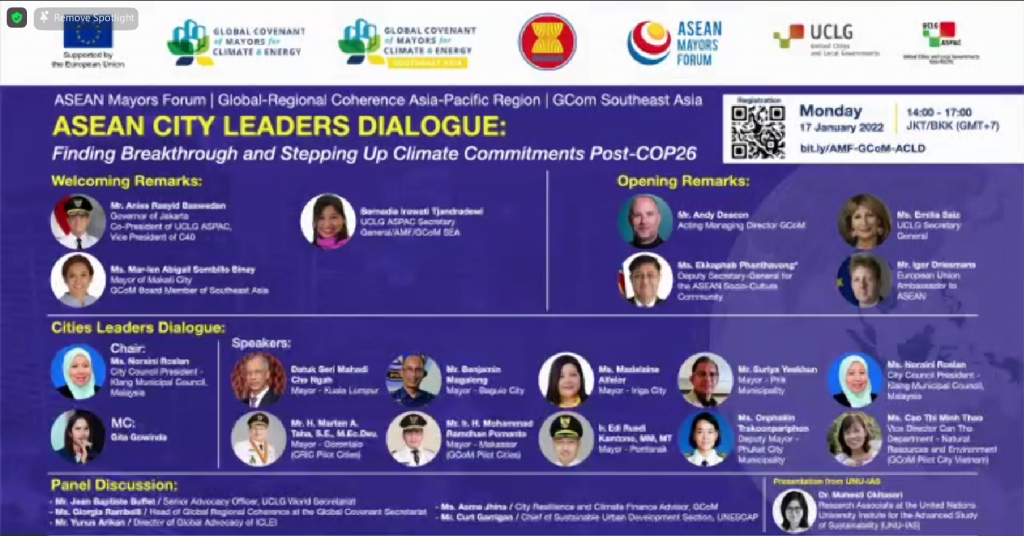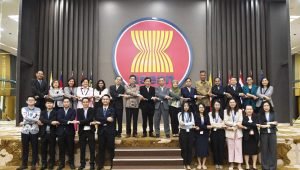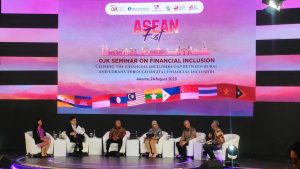For many people, urban cities and their development are seen as promising to reach their dream, find a job, pursue better education, or simply commute. This has increased the cities’ population and inefficient energy consumption, which have become the root of climate change. By the impact of this urbanization, the more densely populated a city is, the more significant the impact of climate change due to high energy use. To address these issues, the cities should ideally combine three sustainability principles and their implementation, including economic expansion with social fairness and little waste generation. From this, we will know which city uses more energy to take appropriate emissions-reduction actions towards the cities. Furthermore, concrete action plans and solutions must be developed to mitigate climate change’s effects and adapt the change action. In brief, green and fair development restoration is needed to continue building a resilient city for the sustainable living of the dense population in the city.
COP26 is a high-level platform for global leaders to deliberate climate change action to ensure future world resilience. Protecting communities, conserving natural ecosystems, mobilizing financing, and bringing nations, corporations, society, and individuals together to implement the Paris Agreement are some examples of COP 26 activities. COP26 has succeeded in creating a consensus on climate action change in the last two years, with more than 190 nations agreeing to lower global warming to 1.5 degrees Celsius. During COP26, cities also demonstrated partnerships to achieve net-zero emissions by 2030 and emphasized the significance of community empowerment. It is not only necessary to raise the city and local government’s understanding and competence in executing their climate action plans, but it is also necessary to create cross-sector collaboration vertically and horizontally.
In responding to the COP 26, the United Cities and Local Governments Asia Pacific (UCLG ASPAC), as the host of Global Covenant of Mayors Secretariat for Southeast Asia (GCoM SEA) and Lead Coordinator for the GCoM Global Regional Coherence (GRC), has successfully organized the ASEAN City Leaders Dialogue under the framework of ASEAN Mayors Forum (AMF) which also hosted by UCLG ASPAC, on Monday, January 17th, 2022. This event was held back-to-back with the GCoM National Webinars in Southeast Asian countries, which took place before the ASEAN City Leaders Dialogue. The dialogue is a very functional platform for city leaders to express their expertise for climate action and ambition to raise climate awareness and provide guidance to local/regional governments on the outcomes of COP26.
With the concept of back-to-back events, the two events have successfully brought together more than 100 participants and representative speakers from UCLG, GCoM Global, UNFCCC, and other COP26 participants, who shared significant findings and recommendations for future climate actions and implementation. Besides, Governors/Mayors/Regents/City Leaders, local government officials, and representatives of local government groups from Southeast Asia also attended this event. In addition, the ASEAN Secretariat, GCoM Global and Regional Asia Pacific officials and partners, Donors, and National Government representatives were among the other attendees as well.
The ASEAN City Leaders Dialogue event was started by the delivering of the welcoming remarks by: Mr. Anies Rasyid Baswedan PhD, Governor of Jakarta, Co-President of UCLG ASPAC, Ms. Mar-len Abigail Sombillo Binay, Mayor of Makati City, GCoM Board Member for Southeast Asia, and Dr. Bernadia Irawati Tjandradewi, Secretary-General of UCLG ASPAC/ AMF/GCoM SEA.
Continuing the Welcome Remarks, it went to the main session, which was the dialogue of the city leaders from ASEAN countries. Opening the dialogue, Datuk Seri Mahadi Che Ngah, Mayor of Kuala Lumpur, said that Kuala Lumpur has an initiative and programs to be implemented in line with reducing 70% carbon emission by 2030 and achieving carbon neutrality by the year 2050. Along with that, Kuala Lumpur has maintained the green initiative and identified the climate actions plan.
Another remarkable speaker was Mr. Benjamin Magalong, Mayor of Baguio City. The mayor stated that Baguio city initiatives to reduce GHG emissions through energy consumption. Under this strategy, the city focuses on a transformation digital program to manage the city as a resource and provide effective strategies for the public by monitoring the valuing Air Quality Index, Urban Index, Climate Mitigation Measure, and Automated Weather Station.
The third session was a panel discussion, which brought together many inspiring global speakers from various institutions, among them namely: Mr. Jean Baptiste, Senior Advocacy Officer UCLG World Secretariat; Mr. Curt Garrigan, Chief of the Sustainable Urban Development Section for the Environment and Development Division of UN ESCAP; Mr. Andy Deacon, Acting managing director of GCoM, Mr. Yunus Arikan, Director of Global Advocacy ICLEI; and Ms. Asma Jhina, City Resilience and Climate Finance Advisor for GCoM. The panel discussion was closed by Dr. Mahesti Okitasari, Research Associate at the United Nations University Institute for the Advanced Study of Sustainability (UNU-IAS). She emphasized the importance of increasing collaboration vertically and horizontally to coherence cooperation.
At the last session, The ASEAN City Leaders Dialogue was ended by the signing ceremony session of GCoM Pilot Cities from four different countries. Some cities that have signed the GCoM Commitment letter before were not signing live during the event. However, the commitment paper was shown and displayed on screen during the signing session. For the live session, representing Indonesia, the regent of Minahasa Utara emphasized the importance of tackling climate change. Besides, the representative of Tam Ky City, Viet Nam, stated that they are happy to join the network and are now implementing the climate action plan. Tam Ky City also wishes to know more best practices from cities worldwide. Another representative from Viet Nam, Cao Lanh city, stated that they appreciated the efforts from different stakeholders to achieve net-zero carbon emission.
All in all, the event was closed by the Secretary-General of UCLG ASPAC, Dr. Bernardia, and said, “I am happy with how things played out today. However, this does not mean our climate commitment has reached a plateau. There is still much to improve and advocate for. In the end, we still have a lot of work to do.”


